
Marco Rubio Endorses Vance But Keeps 2028 Door Open
Vice President JD Vance listens to President Donald Trump and Volodymyr Zelenskyy on Feb. 28, 2025 at the White House. Official White House Photo by Daniel Torok. Public domain.
In a political scene that could rival any episode of "Game of Thrones," Secretary of State Marco Rubio has just played a masterful move in the unfolding drama of the 2028 Republican presidential race. On a seemingly straightforward July afternoon, Rubio publicly endorsed Vice President JD Vance as the ideal GOP nominee for the next presidential election. But beneath the surface of this apparent show of unity perhaps lies a carefully crafted strategy that keeps Rubio's own ambitions very much alive.
A Public Endorsement With a Twist
During an interview with Lara Trump, Rubio praised Vance as "a great nominee," according to the Independent, and expressed hope that the Vice President would throw his hat in the ring for 2028. Rubio's words were warm and supportive, painting Vance as a close friend and a capable leader. Yet, Rubio also made it clear that his current role as Secretary of State keeps him focused on his diplomatic duties, effectively sidelining him from the domestic political fray until at least 2029.
This endorsement, however, is far from a simple passing of the torch. Rubio's careful phrasing and the timing of his comments suggest a dual purpose: to flatter Vance and the MAGA movement while simultaneously signaling that Rubio is not closing the door on his own future presidential aspirations. It's a classic political dance - showing loyalty to the current favorite while keeping options open for a comeback.
The Stakes in the Post-Trump GOP Landscape
The Republican Party is at a crossroads. With President Donald Trump constitutionally barred from running for a third consecutive term, the 2028 race is wide open. Vance, who was chosen as Trump's running mate, has quickly become the face of the MAGA movement's next generation. Yet Rubio, a seasoned campaigner with a history of presidential bids, remains a formidable figure.
Rubio's political resume is far more extensive than Vance's. Having run for president in 2016 and served as a US senator from Florida for over a decade, Rubio has deep roots in early voting states like Iowa, where he still enjoys significant support among party activists. This contrasts with Vance, who is relatively new on the national stage and still building his political brand.
By publicly endorsing Vance, Rubio is not only acknowledging the Vice President's rising star but also positioning himself as a loyal team player. This move could help Rubio maintain influence within the party and the Trump administration, while quietly preparing for a potential run once his diplomatic duties conclude.
Rubio's Calculated Hedging
Rubio's comments reveal a nuanced approach to the 2028 race. While he praised Vance's performance as Vice President and expresses hope that Vance will run, Rubio stopped short of ruling out his own candidacy. "You never know what the future holds," he said, according to the Independent, emphasizing his commitment to his current role.
This hedging is a savvy political tactic. By endorsing Vance, Rubio gains goodwill and avoids alienating the MAGA base that remains loyal to Trump and his chosen successor. At the same time, Rubio keeps his name in the conversation, signaling to supporters and donors that he remains a viable option should circumstances change.
The Optics of Unity and Rivalry
The optics of Rubio's endorsement are carefully balanced. On the surface, it projects party unity at a time when the GOP needs to consolidate its base ahead of a competitive general election. Rubio's praise of Vance as "one of my closest friends in politics," according to the New York Post, reinforces this image of solidarity.
Yet, the subtext is unmistakable. Rubio's history as a presidential contender and his ongoing high-profile role in the Trump administration keep him in the spotlight. His endorsement can be read as a strategic flanking maneuver - supporting the front-runner while quietly preparing for a political resurrection of his own.
The Broader Field and Future Contenders
Rubio is not the only heavyweight eyeing the 2028 race. Florida Governor Ron DeSantis and Texas Senator Ted Cruz are also frequently mentioned as potential contenders. Cruz, in particular, has a strong base in early voting states and has reportedly outperformed Trump in previous Iowa caucuses.
In this crowded field, Rubio's endorsement of Vance could serve multiple purposes: it helps Vance consolidate support, it positions Rubio as a loyalist with influence, and it keeps Rubio's own ambitions alive without direct confrontation.
What This Means for Vance and Rubio
For Vance, Rubio's endorsement is a significant boost. It lends credibility to his relatively young political career and signals acceptance from a seasoned GOP figure. For Rubio, it's a way to stay relevant and respected within the party while fulfilling his current responsibilities.
The 2028 Republican presidential race promises to be a high-stakes contest, with the party's future direction hanging in the balance. Rubio's move is a reminder that in politics, alliances are often temporary, and the game is always on.
As you watch this political saga unfold, remember that Rubio's endorsement is not just about Vance. It's about Rubio's own calculated play for power in a post-Trump GOP world.
References: 'Surprising' rival to JD Vance as next presidential candidate emerges with Republicans preparing for 2028 | Rubio dodges question about running in 2028 and says Vance would make a 'great' White House contender | Rubio on 2028 election: 'I think JD Vance would be a great nominee'






















